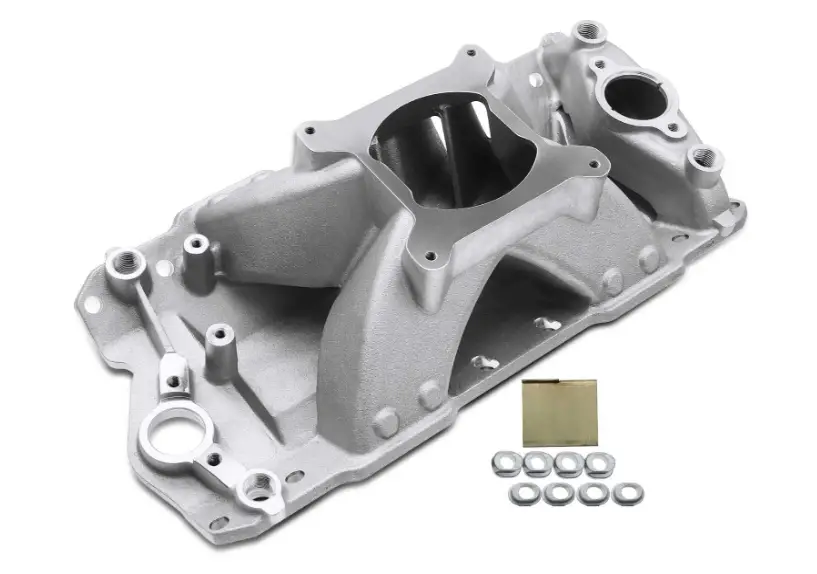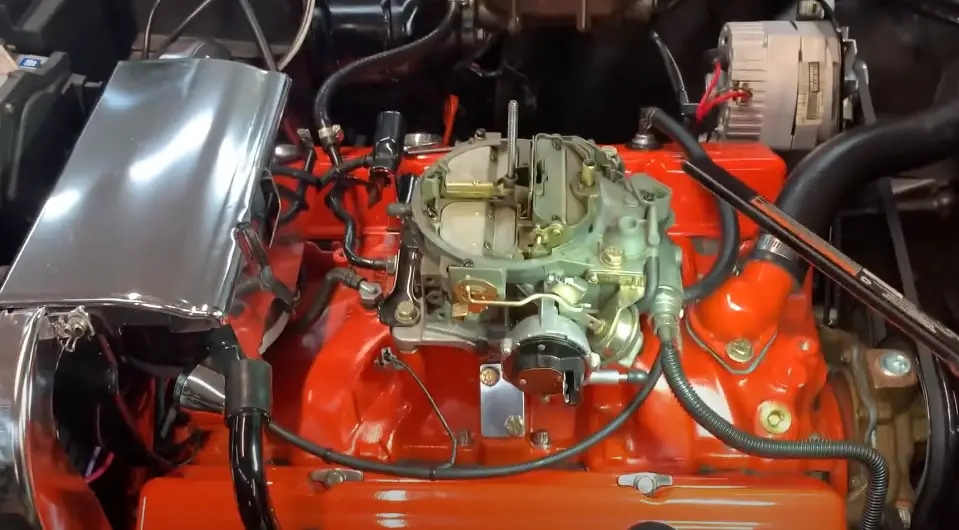Yes, an intake manifold can leak oil, though it’s typically due to issues like a failing valve cover gasket, a malfunctioning PCV system, or a damaged intake manifold gasket. Oil leaks may occur if the gasket fails, allowing oil to seep out or if oil is drawn into the intake manifold through the PCV system.
The intake manifold is a crucial component in an engine, responsible for distributing the air-fuel mixture (or air in direct-injection engines) to the cylinders. While its primary function relates to airflow, issues with the intake manifold can have broader implications for your engine’s health. One question that often arises is whether an intake manifold can leak oil.
The answer is yes, but the circumstances and reasons for such a leak can vary. This blog post delves into the details of how and why an intake manifold might leak oil, the implications of such a leak, and what steps you should take if you encounter this issue.

Contents
Intake Manifold’s Role and Its Gaskets
Before discussing how an intake manifold might leak oil, it’s essential to understand its role in the engine and the importance of the gaskets that seal it.
- Intake Manifold Function: The intake manifold is designed to evenly distribute the air or air-fuel mixture to the engine’s cylinders. In some engines, particularly those with a V-configuration, the intake manifold also serves as a conduit for coolant and, in some cases, oil.
- Gaskets: The intake manifold is bolted to the cylinder head(s) and sealed with gaskets. These gaskets are crucial in preventing leaks of air, coolant, and oil. Over time, these gaskets can degrade due to heat, pressure, and exposure to chemicals, potentially leading to leaks.
Can Intake Manifold Leak Oil?
The intake manifold itself is not typically an oil conduit, but there are scenarios where oil can leak in connection with the manifold. Here’s how:
1. Valve Cover Gasket Failure
One of the most common causes of oil leaking around the intake manifold is actually a failure of the valve cover gasket. The valve cover sits above the cylinder head and contains the camshafts and rocker arms, which are lubricated by engine oil. If the valve cover gasket fails, oil can leak down onto the intake manifold. This can give the appearance that the manifold itself is leaking oil.
Symptoms:
- Visible oil on the exterior of the intake manifold.
- Oil pooling around the base of the manifold.
- Burning oil smell if oil drips onto hot engine components.
2. PCV (Positive Crankcase Ventilation) System Issues
The PCV system is designed to ventilate crankcase gases back into the intake manifold to be burned in the combustion process. If there is an issue with the PCV valve or the associated hoses, it can cause oil to be sucked into the intake manifold. This can lead to oil leaks at the manifold gasket, where it meets the cylinder head.
Symptoms:
- Oil deposits in the intake manifold.
- Oily residue around the manifold gaskets.
- Engine performance issues such as rough idling or stalling.
3. Intake Manifold Gasket Failure
While less common, a failure in the intake manifold gasket itself can lead to oil leaks, especially in engines where oil passages are located close to the intake ports. In some V-type engines, the intake manifold gasket might also seal oil passages. If this gasket fails, oil can seep into the intake manifold or leak externally.
Symptoms:
- Oil leaking from the edges of the intake manifold.
- Oily residue on the engine block beneath the manifold.
- Loss of engine oil without an obvious source.
4. Cracked or Warped Intake Manifold
In rare cases, the intake manifold itself can develop cracks or become warped due to extreme heat cycles or manufacturing defects. If the manifold cracks near an oil passage or if the gasket sealing surface is compromised, oil can leak through these cracks.
Symptoms:
- Unexplained oil loss.
- Visible cracks in the intake manifold.
- Oil dripping from the manifold area.

Effect of Intake Manifold Oil Leaks
An oil leak at or near the intake manifold can have several consequences for your engine’s performance and longevity:
1. Reduced Engine Performance
Oil leaks can lead to fouling of the spark plugs and oxygen sensors, which can cause engine misfires, rough idling, and reduced fuel efficiency. Oil in the intake air can also disrupt the proper air-fuel mixture, leading to poor combustion.
2. Engine Overheating
If the intake manifold gasket also seals coolant passages (as in some engines), an oil leak might accompany a coolant leak. Loss of coolant can lead to engine overheating, which can cause severe engine damage if not addressed promptly.
3. Environmental Impact
Oil leaks are not just a mechanical issue; they can also have environmental consequences. Leaking oil can drip onto the ground, leading to soil and water contamination. Additionally, oil leaks that reach hot engine components can produce harmful fumes.
4. Increased Maintenance Costs
Ignoring an oil leak can lead to more extensive damage over time, including damage to other engine components like the timing belt, alternator, or exhaust system. This can result in higher repair costs.
How to Fix Intake Manifold Oil Leak
If you suspect an intake manifold oil leak, it’s crucial to diagnose and address the issue as soon as possible. Here’s how:
1. Visual Inspection
Start by performing a visual inspection of the intake manifold and surrounding components. Look for signs of oil leaks around the valve cover, PCV valve, and the base of the intake manifold. Check for oil pooling in areas that shouldn’t have oil.
2. Check the PCV System
Inspect the PCV valve and associated hoses for blockages, cracks, or signs of oil contamination. A malfunctioning PCV system can cause oil to be drawn into the intake manifold, leading to leaks and other engine issues.
3. Pressure Testing
If a gasket failure is suspected, a pressure test can help identify leaks. By pressurizing the cooling system or crankcase, you can see if oil or coolant is seeping through the intake manifold gasket.
4. Repair or Replace Components
Depending on the diagnosis, you may need to replace the valve cover gasket, intake manifold gasket, or even the intake manifold itself. If the PCV valve is faulty, replacing it can resolve the oil leak and prevent further issues.
5. Professional Inspection
If the source of the leak is not obvious or if you suspect more extensive damage, it’s best to have a professional mechanic inspect the engine. They can use specialized tools and techniques to accurately diagnose and repair the problem.
Frequently Asked Questions
Here are some FAQs about the intake manifold oil leak –
1. Can an intake manifold leak oil directly?
Yes, but it’s rare. The intake manifold itself isn’t typically an oil-carrying component. However, if the manifold gasket fails or if the manifold is cracked, oil from nearby passages or the valve cover can leak onto or into the manifold.
2. How do I know if my intake manifold is leaking oil or something else?
Visual inspection is the first step. Look for the source of the oil leak. If it’s coming from around the valve cover, it’s likely a valve cover gasket issue. If it’s near the manifold gasket, it could be the intake manifold or gasket.
3. What are the risks of driving with an oil leak near the intake manifold?
Driving with an oil leak can lead to reduced engine performance, increased wear on engine components, potential overheating, and environmental damage. It’s important to address oil leaks promptly to avoid more severe damage.
4. How expensive is it to fix an oil leak related to the intake manifold?
The cost depends on the root cause of the leak. Replacing a valve cover gasket might cost a few hundred dollars, while replacing an intake manifold or its gasket could be more expensive, depending on the vehicle make and model.
5. Can oil leaks from the intake manifold affect other engine parts?
Yes, oil leaks can damage other engine parts, including the timing belt, alternator, and exhaust system. Oil on these components can cause them to fail prematurely, leading to more costly repairs.
Conclusion
While an intake manifold is not typically associated with oil circulation, there are circumstances where it can leak oil due to gasket failures, PCV system issues, or even cracks in the manifold itself. Such leaks can lead to a range of engine problems, from reduced performance to potential overheating.
Early diagnosis and repair are crucial to maintaining your engine’s health and avoiding costly repairs down the road. If you suspect an oil leak around your intake manifold, don’t hesitate to inspect it or seek professional assistance to resolve the issue.